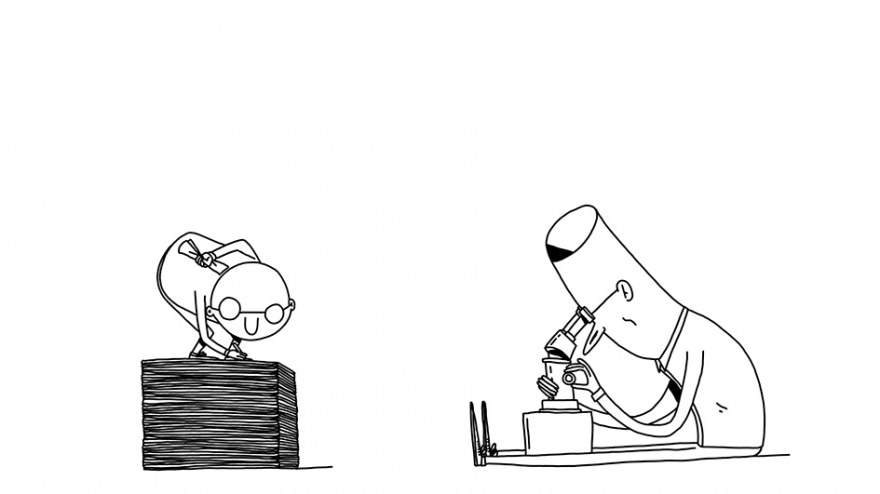Tea time with Des résidus analytiques. (Analytic Residue.)
Interview with Jon Boutin, director of Des résidus analytiques. (Analytic Residue.)
How did you come up with the idea for your film?
I’m in the habit of drawing in notebooks, especially zap books whose paper is a bit heavier and nicer. It’s most likely my obsession with leaving a trace of each idea, or not throwing anything away. I love sketchbooks. Over three-quarters of the film come directly from my big, yellow zap book. And I wanted to recreate the feeling of leafing through a sketchbook with its interlocking stories, with characters who turn up here and there, evolving, or who disappear forever, whose lives can be summed up in one sentence or one single drawing.
What in particular drew you to the food for thought that the sciences and metaphysical questioning provide?
It was exactly their point of convergence that interested me. I remember my advanced math classes where we had to show that x was an even number, and that the same x did not exist. Or we had to show that there is an infinite number of prime numbers. It felt like that was getting close to philosophy, to a type of subject that went beyond the sciences and every other subject. Maybe that’s what metaphysics is. A totally cold, abstract, cerebral world that nevertheless touches on important, very human questions like existence, the infinite, etc.
The voices seem to be composed of specific technological elements, such as programmed voices. How did you create them?
I first tried to work with human voices, but I couldn’t find the right tone. They didn’t fit with the film. Then I turned to artificial voices. Their algorithmic neutrality and lack of tone fit perfectly with the images. They created the perfect disconnect. The hardest part was telling Théophile that I was replacing him with a cheap computer program. I looked for free programs, like the ones for virtual greeting cards where you clearly hear the absurd quality of the digital intonations. I had to write everything phonetically since those programs aren’t really up on many words. I recorded three different virtual actors, then took my favorite version of each sentence fragment.
In your film, did you want to depict “knowledge” more as a burden than a chance?
I’ve been fascinated by the fantasy of absolute knowledge for a long time. I like to think of it as a giant burden. Something frightening, paralyzing. I keep thinking of the discovery of something really unexpected and unbelievable. That’s why in the film we don’t see what the scientists see. At the other extreme, through their ignorance, the tourists who follow the “gouide” or the “Ptolemaic man” are the happiest in the cartoon. They should never be told how contingent it is in the universe.
How did you develop the animation for the film? Was it a conscious decision that was tied to the subject you tackled and a desire to recreate scenes of the “popularization” of the sciences?
I don’t much like the shows that popularize the sciences. I think I prefer to attend a scientific talk and understand only a tenth of what’s said. I’m attracted to what seems complicated, incomprehensible. Which is why there is a an “explanation” scene that is absurdly staged. I think that’s funny. The question on the horizon of an infinite plane is one that I truly wonder about and I haven’t always been able to find an answer to. Perhaps someone will answer me thanks to the film…
Science enters our daily life gradually through “discoveries”, but what do you think remains of that knowledge in our collective memory?
I imagine it’s something pretty vague, like, “No, Pluto’s not a planet anymore!” or “Actually, this is all a void, there is nothing here… just electrons spinning really fast…” Analytic residue, if you will!
Any cinematic coups de cœur in the past year you’d like to tell us about?
Bruno Dumont’s Slack Bay made me laugh a lot. It’s a completely absurd film with a fat man-balloon who flies away at the end. And also My Life as a Zucchini. I was with some friends in the theater and no one so much as moved through the whole end credits, and then when we had to get up and leave, we looked at each other in silence with moist eyes and said: “Ok, let’s wait a bit before we talk…” A long time afterwards, tears still welled up every time I thought about it. It’s an amazing film!
If you’ve already been to Clermont-Ferrand, could you share with us an anecdote from the festival? If not, what are your expectations for this year?
Every year, there’s a screening in a pool (which I’ve never had the chance to attend). Last year, there were shower caps in all of the Festival bags. A friend and I put them on our heads just before a screening. The lights went down. The projection began. I had no idea that a simple bit of plastic on your head could so radically change your perception of a film. I’m definitely going to do that more often. We had to take them off before the end, since they get very hot outside the water.
Des résidus analytiques. is being shown in National Competition F9.








